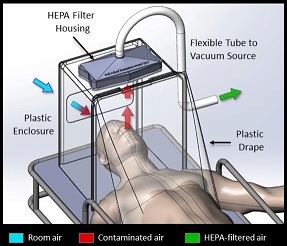
A multidisciplinary team of researchers and clinicians, including McGowan Institute for Regenerative Medicine faculty member Peter Rubin, MD, FACS, Chair of the Department of Plastic Surgery, the UPMC Endowed Professor of Plastic Surgery, Director of UPMC Wound Healing Services, and Professor of Bioengineering at the University of Pittsburgh, is working on a low-cost negative pressure hood that can be used to protect medical staff during intubations and other situations where aerosol spray is likely from infected patients. Moreover, it can also help prevent spread in environments without a negative pressure room, such as the Emergency Department of a hospital. This apparatus is different and far advanced compared with static protection boxes which are only passive shields. What makes this new hood most remarkable is its active airflow and HEPA filtering.
The device is the brainchild of David Turer, MD, MS, a chief resident in the Department of Plastic Surgery who is also an engineer. The rough prototype is made with hardware store parts and 3D printed parts specifically designed for this application. This device can be manufactured in large numbers very quickly with injection molding and stock parts.
The team is very close to a “field ready” version and McGowan Institute for Regenerative Medicine affiliate faculty member Ron Poropatich, MD, Director of the Center for Military Medicine Research, Health Sciences and Professor of Medicine in the Division of Pulmonary, Allergy, and Critical Care Medicine at the University of Pittsburgh, and a Senior Advisor for Telemedicine, UPMC, is helping with outreach to the U.S. Department of Defense. The military uses are evident, with ability to contain spread of an outbreak in close quarters environments such as an aircraft carrier. Cameron Good, PhD, one of the team members, is a scientist in an army laboratory.
Other notable members of the team include Benjamin Schilling, MS, Robert Turer, MD, MSE, Lucas Dvoracek, MD, Heng Ban, PhD, and Jason Chang, MD.
Illustration: Portable Individual Biocontainment Unit. David Turer, MD, MS.
